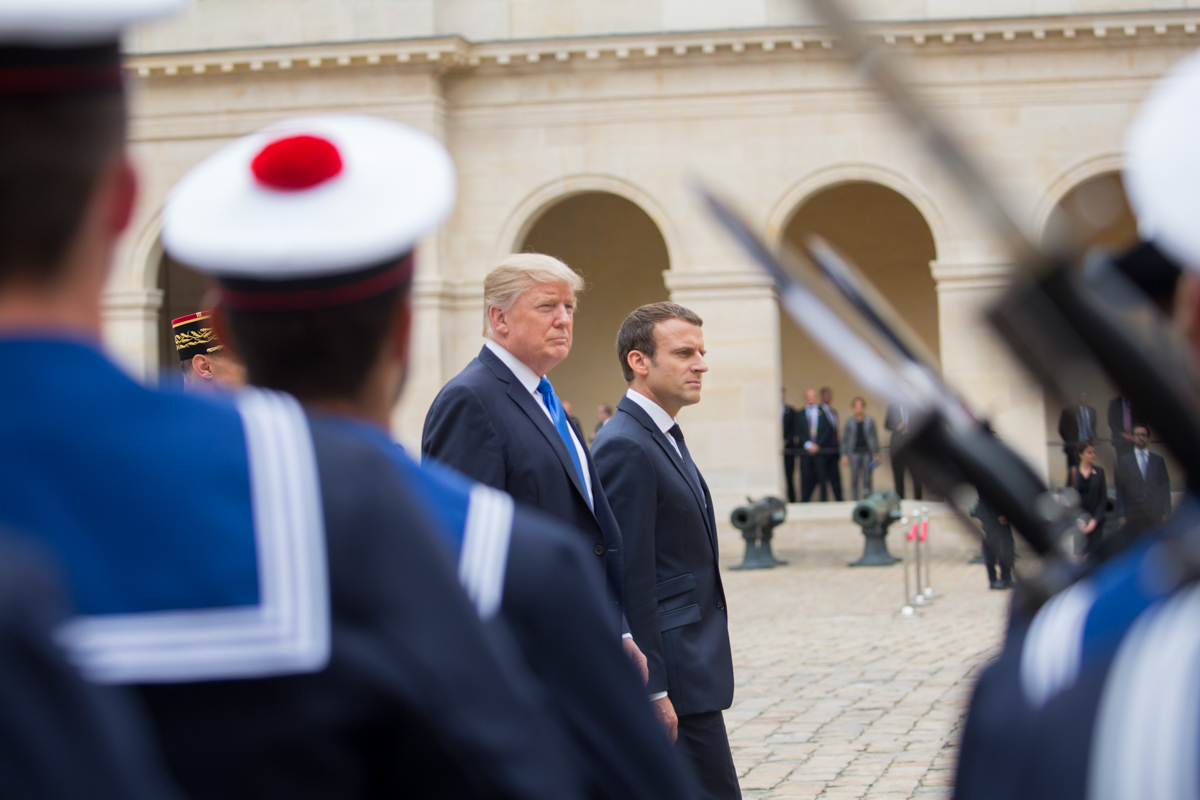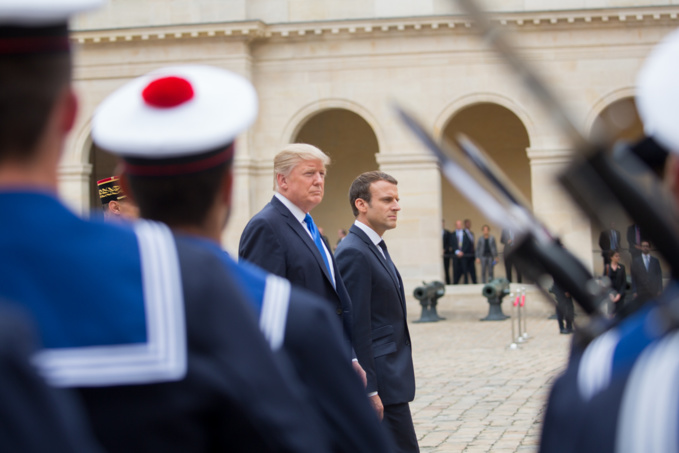President Macron's visit to the United States is timed to coincide with the 250th anniversary of the establishment of diplomatic relations between the United States and France and has the status of a state visit, which is the highest in the diplomacy ranking. On Friday, German Chancellor, the informal leader of the EU and the closest partner of Emmanuel Macron in Europe Angela Merkel will also arrive in Washington after the French leader.
The two meeting are taking place on the eve of the 44th G7 summit, which will be held June 7-8 in the Canadian city of La Malbaie with the participation of Donald Trump, Emmanuel Macron and Angela Merkel. Thus, this week will become a decisive brainstorm of the leaders of the Euro-Atlantic world, aimed to settle differences between them.
The program of Emmanuel Macron's visit to the US turned out to be not only extremely saturated, but also full of symbolism. Apparently, it was designed to prove that France has much to do with the Anglo-Saxon world.
However, on the eve of the talks between Donald Trump and Emmanuel Macron, Paris made it clear that the dialogue would not be easy. The official representative of the French government Benjamin Griveaux specified that the current relations between the countries are "about different things: both good and not so". He emphasized that Emmanuel Macron came to the United States to conduct a dialogue on behalf of not only France, but also all of Europe.
The agenda of the summit included issues related to the Iranian nuclear program, Syria and the Middle East, as well as problems of climate and international trade. The countries’ attitudes towards Syria coincide in many respects, as evidenced by the recent missile strikes by the United States, Britain and France. However, there are some other problems that have to be solved.
France is trying to preserve the nuclear agreement of July 2015 with Iran, revised by other members of the "six" international mediators. Donald Trump, however, is seeking revision. The US President's decision to recognize Jerusalem as the capital of Israel and shifting the US embassy also runs counter to France's diplomatic efforts, in particular, to decisions of a conference on the Middle East held in Paris in January 2017 (Israel ignored this forum). In addition, Donald Trump is trying to become the "gravedigger" of the Paris agreement on the climate of 2015. Recall that the agreement was one of the achievements of French diplomacy in recent years.
Despite the public demonstration of "chemistry" between the two leaders, which allowed Donald Trump to conclude the French guest on Tuesday and kiss him on both cheeks, the search for a compromise was difficult. Donald Trump called the Joint Comprehensive Plan of Action on Iran (the Iran deal) "insane" and "ridiculous".
In turn, the French president tried to persuade his American colleague not to leave it. This exit (which Trump announced on May 12) would have extremely negative consequences for the European Union. And it's not just that Iran can resume its nuclear program. The main thing is that if the transaction was broken and the US sanctions were resumed, the EU would face an extremely difficult fork of two bad options. What would Europe do? To submit to American sanctions (which are known to be extraterritorial and require their execution by all countries of the world, threatening them otherwise with billions of fines and closing the US market) and lose billions invested in Iran? Or rebel and openly conflict with the United States, fraught with a transatlantic trade war?
Did Macron persuade Trump? On the one hand, there is a hope for this. "We need to be flexible, we need to be flexible in life, and as a leader of the state, we need to demonstrate this flexibility," the US president said. On the other hand, it is obvious that the nuclear deal cannot be revised so that the final version takes into account concerns expressed by Trump (regarding the missile program, Iran’s expansion Iran in the Middle East, and introducing permanent restrictions on the peaceful Iranian nuclear program).
source: reuters.com
The two meeting are taking place on the eve of the 44th G7 summit, which will be held June 7-8 in the Canadian city of La Malbaie with the participation of Donald Trump, Emmanuel Macron and Angela Merkel. Thus, this week will become a decisive brainstorm of the leaders of the Euro-Atlantic world, aimed to settle differences between them.
The program of Emmanuel Macron's visit to the US turned out to be not only extremely saturated, but also full of symbolism. Apparently, it was designed to prove that France has much to do with the Anglo-Saxon world.
However, on the eve of the talks between Donald Trump and Emmanuel Macron, Paris made it clear that the dialogue would not be easy. The official representative of the French government Benjamin Griveaux specified that the current relations between the countries are "about different things: both good and not so". He emphasized that Emmanuel Macron came to the United States to conduct a dialogue on behalf of not only France, but also all of Europe.
The agenda of the summit included issues related to the Iranian nuclear program, Syria and the Middle East, as well as problems of climate and international trade. The countries’ attitudes towards Syria coincide in many respects, as evidenced by the recent missile strikes by the United States, Britain and France. However, there are some other problems that have to be solved.
France is trying to preserve the nuclear agreement of July 2015 with Iran, revised by other members of the "six" international mediators. Donald Trump, however, is seeking revision. The US President's decision to recognize Jerusalem as the capital of Israel and shifting the US embassy also runs counter to France's diplomatic efforts, in particular, to decisions of a conference on the Middle East held in Paris in January 2017 (Israel ignored this forum). In addition, Donald Trump is trying to become the "gravedigger" of the Paris agreement on the climate of 2015. Recall that the agreement was one of the achievements of French diplomacy in recent years.
Despite the public demonstration of "chemistry" between the two leaders, which allowed Donald Trump to conclude the French guest on Tuesday and kiss him on both cheeks, the search for a compromise was difficult. Donald Trump called the Joint Comprehensive Plan of Action on Iran (the Iran deal) "insane" and "ridiculous".
In turn, the French president tried to persuade his American colleague not to leave it. This exit (which Trump announced on May 12) would have extremely negative consequences for the European Union. And it's not just that Iran can resume its nuclear program. The main thing is that if the transaction was broken and the US sanctions were resumed, the EU would face an extremely difficult fork of two bad options. What would Europe do? To submit to American sanctions (which are known to be extraterritorial and require their execution by all countries of the world, threatening them otherwise with billions of fines and closing the US market) and lose billions invested in Iran? Or rebel and openly conflict with the United States, fraught with a transatlantic trade war?
Did Macron persuade Trump? On the one hand, there is a hope for this. "We need to be flexible, we need to be flexible in life, and as a leader of the state, we need to demonstrate this flexibility," the US president said. On the other hand, it is obvious that the nuclear deal cannot be revised so that the final version takes into account concerns expressed by Trump (regarding the missile program, Iran’s expansion Iran in the Middle East, and introducing permanent restrictions on the peaceful Iranian nuclear program).
source: reuters.com



















